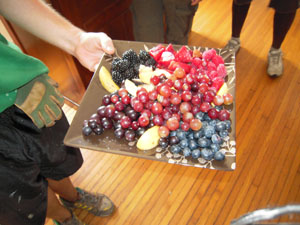Ever wonder why we at G3 insist on serving organic and sustainably farmed food at our workshops? We believe that becoming Attainable Sustainable starts with the smallest actions and is reinforced by the way we strive to live our lives. For example, over the last year or so, I have become completely grossed out by the idea of eating a non-organic strawberry. They look great in the grocery stores, and smell really good too. But, after hearing about how non-organic farmers use methyl bromide to fumigate them, and being such a Soil Party fan, I decided it wasn’t worth supporting such practices with my hard-earned dollars. I think about THATchoice every time I attend a corporate meeting, conference, or seminar where the obligatory fruit plate on a plastic tray is served up. What are these seminar organizers thinking when they expose their Participants to the unsustainable cycle that the non-organic berries represent: chemicals discharged into the air, soil, and water; polluted runoff; dead Soil Party, dead invertebrates and their predators; minimum-wage workers exposed to toxic chemicals; consumers poisoned, etc.
At a G3 workshop, however, we’re putting the organic berry on the plate because we’re considering the health of our teachers and you, our Participants. We’re also thinking about how to best support sustainable land stewardship practices, in farming and in neighborhoods. So, here’s a little food for thought — In the Los Angeles Times today: A discussion of the recent University of Southern California’s Keck School of Medicine’s study published in the Journal of Epidemiology finding a link between neighborhood pesticide use and increased risk of prostate cancer. The study was conducted on workers who lived NEAR the farms that used the pesticides. It points out that those who handled the chemicals were probably wearing protective gear, but the effects are felt most alarmingly by those who came in contact with the pesticides in the adjacent community. The study also explored the implications of pesticides applied by those who did not wear protective gear, consistent with the use by regular homeowners.
So, the G3 response is simple: Pesticides of ANY KIND are a Buzz-kill. Don’t use them, and encourage your neighbors to do the same! Learn more about how to develop landscapes that do not require any chemical inputs at one of our upcoming Core Concepts Workshops, or Homeowner Classes.

